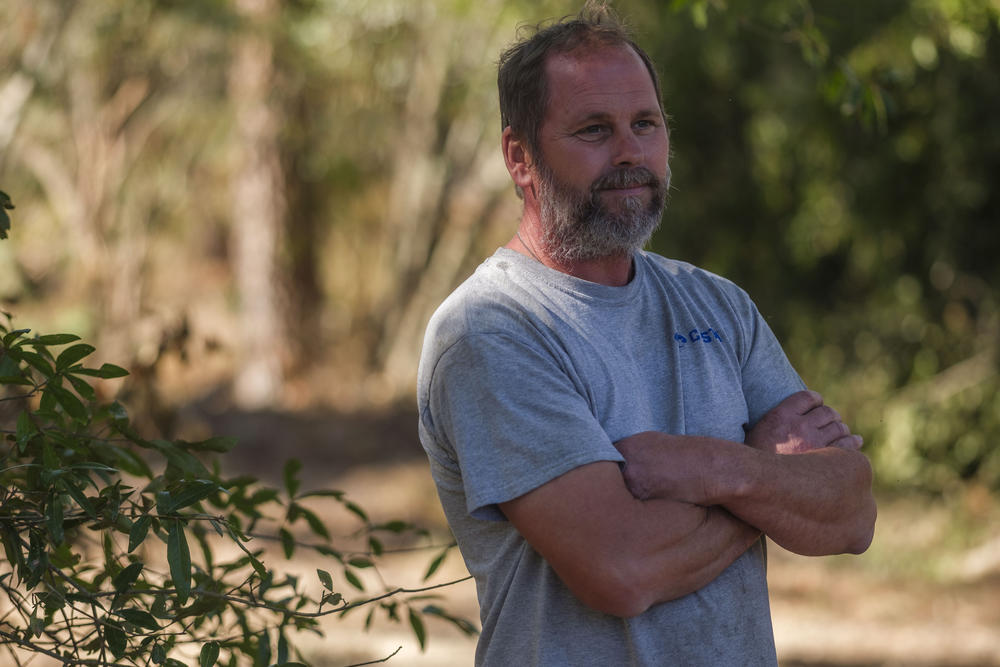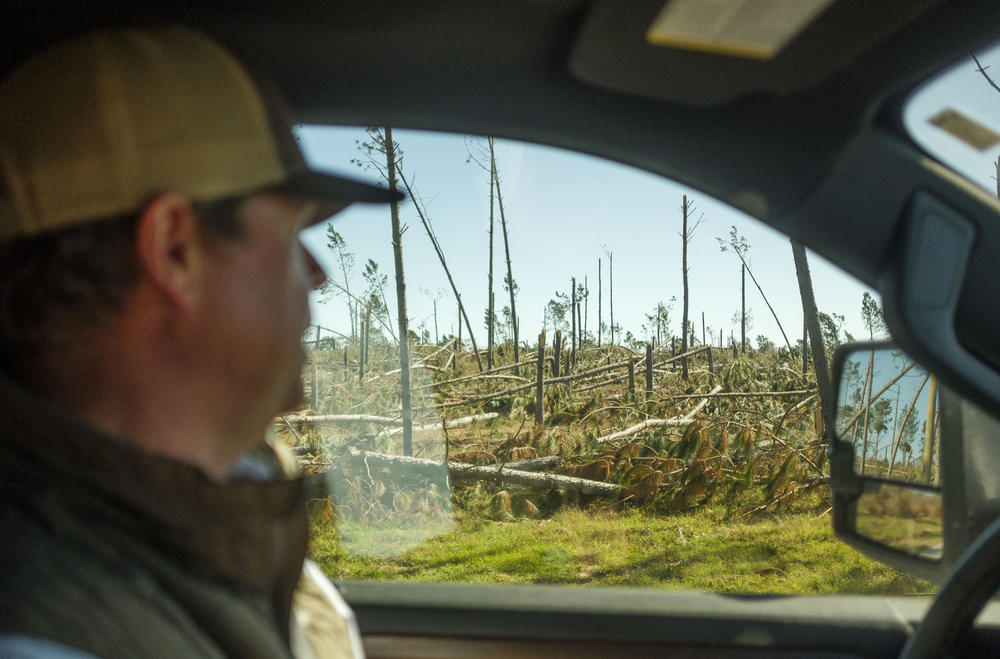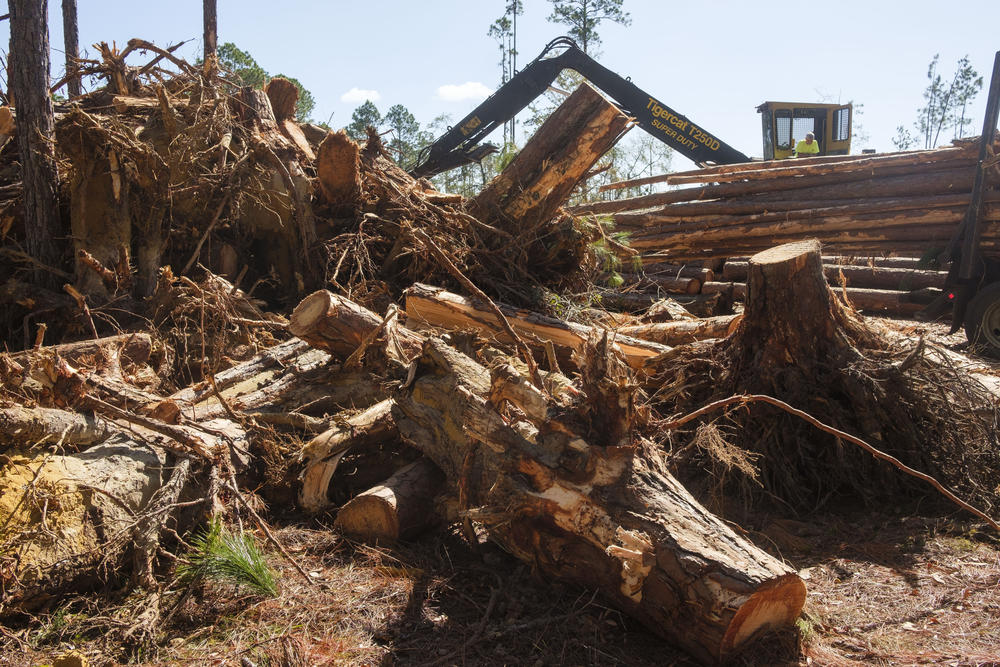
Caption
Treutlen County logger and timber land owner Wade Webb says he tries not to think about how Hurricane Helene affected his plans for retirement. "It makes me depressed," he said.
Credit: Grant Blankenship/GPB News
|Updated: November 15, 2024 10:36 AM
LISTEN: When Hurricane Helene raged through Georgia forests, it not only toppled trees. For many landowners, it blew away nest eggs, too. GPB's Grant Blankenship reports.

Treutlen County logger and timber land owner Wade Webb says he tries not to think about how Hurricane Helene affected his plans for retirement. "It makes me depressed," he said.
In clearing in a pine forest 75 miles east of Macon, in Treutlen County, a pile of stumps and root balls grows as Wade Webb’s logging crew adapts machines made for cutting down trees to the job of slowly plucking them out of the jumble left by the 90-mph winds of Hurricane Helene.
This is not Webb’s land. It sounds like his land looks worse.
“There's one block that I looked at and I wanted to cut this year. It's 60 acres of stuff like this right here,” Webb said as a claw arm sorted trees up the hill.
“Ain't 15 acres of it standing.”
Those trees had likely been growing longer than the 24 years Webb has been in this business.
“Last year, we was cutting $3,500 an acre off of it, and now you're going to be looking to get $1,000 an acre off of it,” Webb said. “So you multiply that times 60. That's a lot.”
Enough, he said, to change the course of your life.
“I mean, that's what was going to make my retirement.”
Wade Webb is not alone.
Estimated commercial timber losses come to about $1.8 billion across the four states hit hardest by Helene — Georgia, South Carolina, North Carolina and Florida. But Georgia losses by themselves account for about three quarters of that, some $1.3 billion. That’s according to a joint report by the Georgia Forestry Commission and the Warnell School of Forestry at the University of Georgia.
Some of those losses are on land owned by Ben Gillis and his family. Gillis is also a board member on the Georgia Forestry Commission. Standing at the edge of another catastrophically damaged tree stand, he described what was lost.
“This stand ... It’s about 30 years old. Really needed another five years, you know?” he said.
That's if it were to sell for top dollar as saw timber. That’s what you buy at the home improvement store or what is used to build a house.
“Before Helene, saw timber was bringing in about $35 a ton,” Gillis said. “And you put 30 tons to the load.”
A load is one of those log trucks you have likely seen on the highway. That comes to about $1,050 worth of timber on one truck.
But Gillis says after Helene, prices are dropping.

A catastrophically damaged timber stand in Treutlen County is seen from Ben Gillis' truck.
For one thing, even trees that look like they survived unscathed turn out to be internally damaged once they are at the mill.
“They're saying that the damage that was created by the winds put some splinters inside the tree and they have to do a lot more work to find a usable piece of lumber out of it,” Gillis said.
Gillis said that’s one reason why now even the highest timber prices are half what they were before Helene.
Gillis said the longer a fallen tree stays on the ground, the more the wood degrades, or blues, and once a tree blues it’s really only good for pulpwood, for paper and cardboard, from then on. Pulpwood fetches the lowest price at market, which means timber owners are trying to outrun decay.
“It’s a race against time right now,” he said.
That, in turn, is flooding the market.
“It's totally flooded, absolutely," Gillis said. "Absolutely.”
And so prices fall even further. Now reconsider a tree meant for saw timber before Helene at $35 dollars a ton but which sat on the ground until it blued into pulpwood. ...what’s it worth now?
“A load of pulpwood’s going to bring $100,” Gillis said.
That’s for a whole logging truck full of trees. In the worst-case scenario, that's a 90% drop in value for trees that have been growing for a generation.

A pile of discarded stumps lopped off by loggers from trees toppled by Hurricane Helene by loggers lay in Treutlen County, Ga.
If there are winners here, they could be the independent loggers, truckers and the mills, but it’s easy to see how farmers in an industry where there is no crop insurance are wondering how they can afford storm cleanup. Gillis said they are looking to the federal government for help.
“They’re wanting some way to be made whole, you know?” he said.
Republican U.S. Rep. Austin Scott said he doesn’t expect that to happen.
“I do not believe that anybody will be made whole,” Scott said.
Scott serves on the House Agriculture Committee which will be taking up federal Hurricane Helene disaster relief for farmers.
“There will be a lot of help for timber with cleanup,” Scott said. “I expect, hopefully, help with the replanting. But, you know, if somebody had $1 million worth of timber that got blown down, I do not expect that they're going to be made whole.”
While Governor Brian Kemp has already steered $25 million Ben Gillis said some timber growers are left wondering what comes next.
“Most of these landowners are 50 to 90 years old,” Gillis said. “There's not a lot of Gen Zers that own timberland and grow timber, right?”
Even at the young end of that age range, growers now in their 50s would be in their 80s before they could profit from what they replant tomorrow.
Gillis said some are looking for new revenue streams. Already, you can see solar arrays peeking through the tree line here and there.
“I guarantee you there's people today that, you know, three weeks ago would have said no to a solar field, and today they would heavily consider it.”
Governor Brian Kemp has steered some $25 million of state money to timber industry recovery.
For his part, Scott said trading trees for solar farms would only further damage a struggling industry and the businesses that support it.